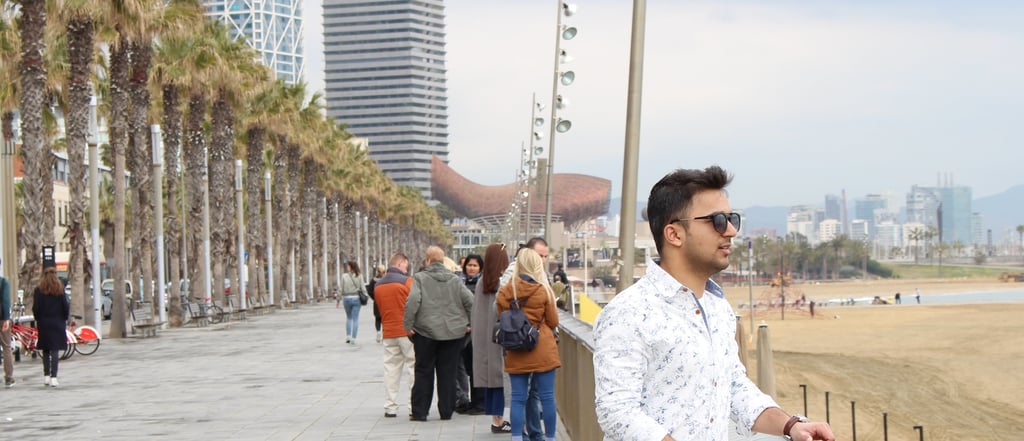Tips for Europe
From all the good and bitter experiences, I have gathered the most useful tips
Essential Tips for Traveling in Europe
Planning a trip to Europe feels exciting, but it can also feel a bit overwhelming because every country has its own rhythm, style, and tiny quirks. After exploring so many cities, towns, and hidden corners across the continent, I’ve gathered the kind of practical tips that make travel smoother, cheaper, and way more enjoyable. This guide is all about real, experience-based advice that helps you travel like you’ve been here a hundred times.
1. Trains Are Your Friend
Europe’s train system is honestly one of the best things about traveling here. High-speed trains like ICE, TGV, and Frecciarossa make country-to-country travel easy and surprisingly relaxing. You can have a look at Eurail, they offer passes with which you can travel to 33 countries in Europe, find the one that suits you best.
A few quick notes:
Book early for cheaper tickets.
Buses are the cheapest (like Flixbus) but I would not recommend for longer routes/ overnight travel. They offer trains on some routes as well.
Night trains are amazing if you want to save on hotels.
2. Cash Is Still Useful
Even though Europe is very modern and digitalised, don’t be surprised when small cafés, local bakeries, kiosks or Christmas market stalls prefer cash. Always have a little Euros on hand. In countries where Euro isn't the official currency like Czech Republic or Hungary, they accept Euros but will return you the change in local currency at an exchange rate of their own. Its better to pay with card or exchange some money (maybe 200€) beforehand.
3. Travel Light — Cobblestones Don’t Care
Rolling huge and heavy suitcases on old cobblestone streets? Not fun. Many historic areas also have stairs instead of elevators. Its better and easier to travel light.
Carry-on size luggage is your best friend.
Pack layers instead of bulky jackets.
4. Eat Where the Locals Eat
European cities have restaurants on every corner but the best ones are rarely right next to the big tourist attractions.
Walk 5–10 minutes away from the main square.
A lot of restaurants hang the menu at the entrance. Have a look and decide what suits you best.
In Germany and Austria: you can ask for the Tagesgericht (daily special). It’s cheaper and delicious.
Google maps can help you find Halal restaurants nearby. They are actually everywhere (especially in big cities).
5. Public Transport Over Taxis
Most European cities have excellent public transport like underground metros, trams, and buses that are super easy to navigate. Google maps also show the connections neatly, so you don't have to download extra apps on your phone.
In big cities like Berlin, Vienna, Rome, Paris, day passes are worth it.
In smaller cities, you can walk almost everywhere.
Uber exists but isn’t always cheaper.
6. Sundays Are Quiet
A lot of shops close on Sundays, especially in Germany, Austria, France, and Switzerland. In Germany, you can't even use vacuum cleaner in the home. Restaurants are open, but supermarkets and malls usually aren’t.
Do your shopping on Saturday.
Keep snacks for lazy Sundays.
7. Watch Out for Pickpockets in Tourist Areas
Europe is safe overall, but tourist hotspots attract pickpockets.
Keep your backpack in front in crowded places.
Use inside pockets for your passport and money.
Be extra alert on metros in Paris, Rome, Barcelona.
8. Learn a Few Local Phrases
Even saying a small "hello" or "thank you" in the local language makes people smile :-)
German: Hallo, Danke schön.
French: Bonjour, Merci.
Italian: Ciao, Grazie.
9. Don’t Rush — Europe Is Best Slowly
It’s tempting to do 10 countries in 7 days, but you’ll miss the charm.
Spend at least 2 nights in each city.
Explore smaller towns, often they’re the highlight and tell you more about the country.
Sit in a café and just watch life.
10. Breakfast Is Different Everywhere
In some countries, breakfast is light; in others, it’s a full meal.
France: croissant and coffee
Germany: bread, cheese, cold cuts
UK/Ireland: heavy and warm breakfast
Italy: sweet pastries
So adjust your expectations and enjoy the variety.
11. Stay Flexible With Weather
European weather can flip like a coin. I have been there, trust me!
ALWAYS keep an umbrella.
Layering is key.
Winters can be wet, not snowy, depending on the region.
12. Accomodation
I would recommend to stay near the city center as you can easily walk everywhere. Whether its finding a suitable restaurant or going to the supermarket or a Pharmacy, its always good to stay at a central location. You may find a cheaper hotel in suburb but its not always worth it, you may lose time and money while traveling to and from the city center.
13. Plan
It is the most important part. Plan your whole trip carefully! You should go in a loop around the map or in a straight line, just avoid doubling. Booking hotels way earlier can save you a lot of money, same goes for the flights. We at EuroHost Travels help you with planning your whole trip efficiently and cost-effectively. Contact us by clicking the button at the bottom.
Final Thoughts
Europe is beautiful, diverse, and full of surprises. Whether you’re wandering through tiny medieval streets, trying a new pastry, hopping on a train to another country, or watching the sunset over a historic square, every moment feels like a memory in the making. These tips are just the beginning, I’ll be sharing more city guides, hidden gems, and personal stories from all over the continent. If you’re planning your trip soon, you’re in for something special.


